
Christoph Ramshorn
Chief Cooperation Officer
meteoblue AG

Relevant links
Features
Technical documentation
More free offers
The Image API provides comprehensive visualisations for complex use cases and is available for every point on Earth.
Specific displays of climate diagrams and climate change scenarios are available as well as forecast meteograms tailored to the particular needs of the user.
We would be pleased to support you with a free API trial access upon request.

Christoph Ramshorn
Chief Cooperation Officer
meteoblue AG

The following images display the meteoblue weather forecasts. You can select from a wide range of meteograms, multimodel forecasts, pictoprints and professional air diagrams. All Forecast Images are available through the meteoblue Image API.
The following meteograms display forecast images for general purposes.
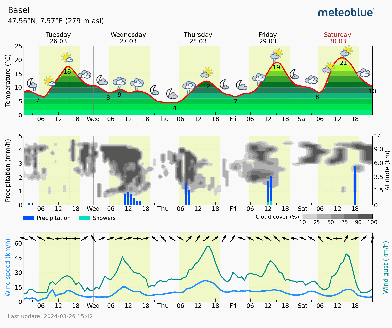
The Meteogram 5-Day shows a forecast for 5 days in 3 different diagrams (temperature, precipitation & clouds and wind charts) for the selected location.
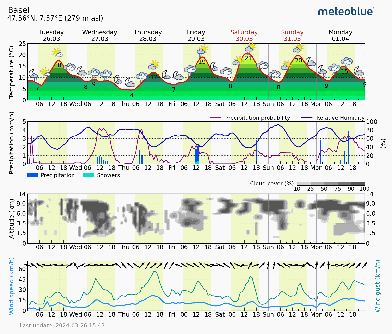
The Meteogram 7-Day shows a forecast for 7 days in 4 different diagrams (temperature, precipitation, clouds and wind charts) for the selected location.
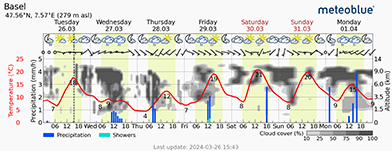
The Meteogram All-in-One shows the weather forecast for the next 6 days in one simple diagram featuring weather pictograms, a temperature curve, precipitation amount and type, cloud development and wind speed and direction in hourly time steps for the selected location.
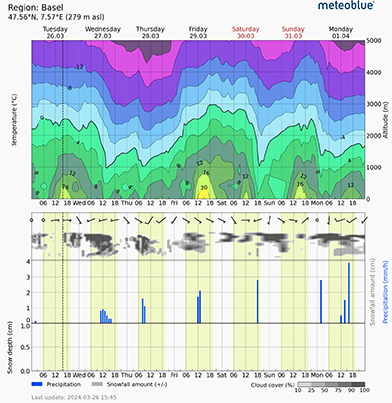
The Meteogram Snow shows the development of temperature at various altitudes, precipitation (blue for rain and light grey for snow), snow melt and snow height (third diagram), corresponding to a grid cell of the selected model, without local adaptations to a specific location.
The following meteograms display the weather forecasts for agronomical purposes. They display a wide range of agronomical variables and support weather dependent decisions such as suitable times for sowing, spraying and harvesting.
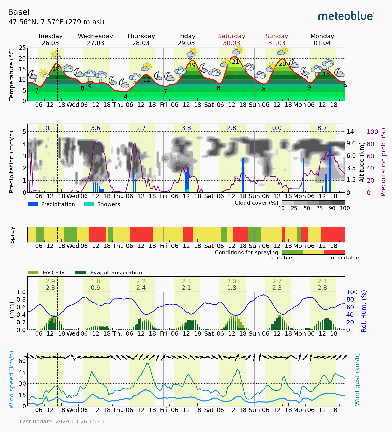
The Meteogram Agro shows the development of the weather with diagrams of air temperature, wind velocity and direction on the ground, as well as precipitation, clouds, spraying windows and evaporation, corresponding to a grid cell of the selected model, without adaptations to a specific location.
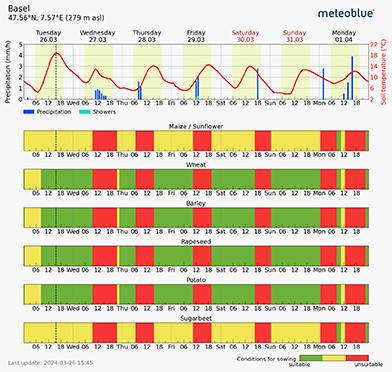
The Meteogram Sowing Windows shows the development of the soil temperature and precipitation up to 7 days ahead. Additionally it includes sowing windows for maize, wheat, barley, rapeseed, potato and sugar beets. The sowing window is separated into three categories: suitable (green), less suitable (yellow) and unsuitable (red) periods for application in hourly intervals.
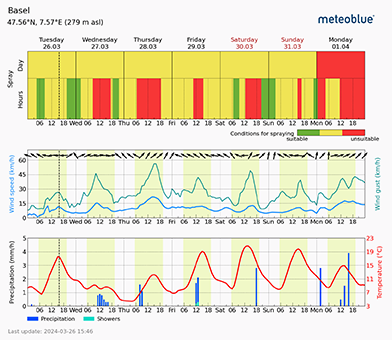
The Meteogram Spraying Window shows the development of the temperature and precipitation for up to 7 days. Additionally it includes the spraying window. The spraying window helps identifying suitable periods for applying crop protection measures, by showing suitable (green), less suitable (yellow) and unsuitable (red) periods for application. The conditions are calculated from wind, precipitation, temperature and humidity.
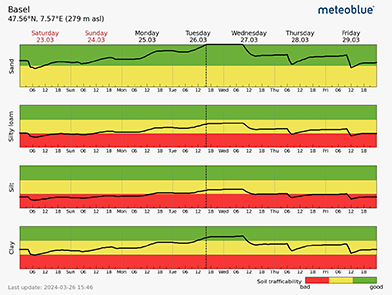
The Meteogram Soil Trafficability shows the capacity of the soil to support moving vehicles based on the development of water content in the topsoil (0-10cm). The development of Soil Trafficability is represented in a line graph (black) that moves though 3 trafficability conditions, good trafficability (green), restricted trafficability (yellow) and no trafficability (red).
The soil trafficability development is calculated for four types of soil: Sand, Silty Loam, Silt and Clay, each of which has a different water holding capacity and reacts differently to weather conditions. The calculation uses information of precipitation amount, sunshine hours, soil-specific water holding capacity and more.
The following meteograms display the weather forecasts for aviational purposes. They provide information about the atmosphere, such as temperature, clouds and wind at different heights.
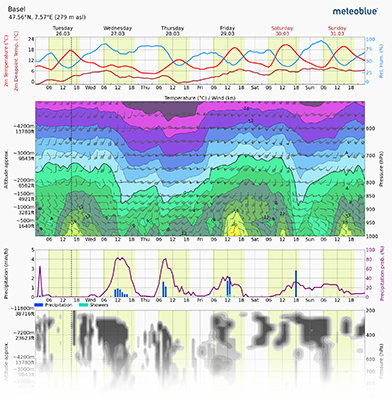
The Meteogram Air shows the weather development in the atmosphere, from ground to around 5500 meters elevation (pressure levels 1020 to 500 hPa respectively) simulating the air layers above the selected location. The forecasts are shown for 3 to 6 days ahead.
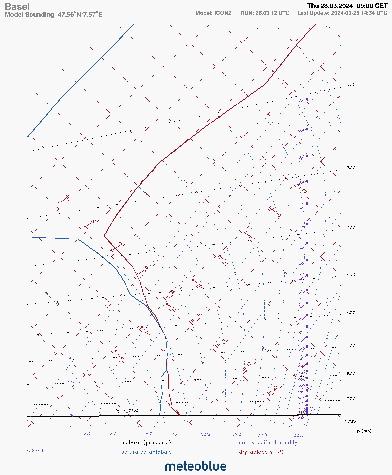
The Sounding Diagram shows the weather development in the atmosphere, from the ground to the stratosphere (pressure levels 1013 to 100 hPa), simulating the measurements of a sounding balloon.
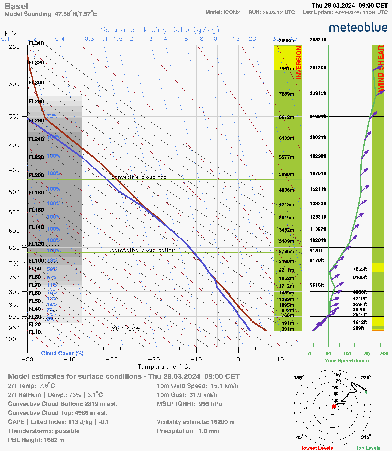
The Stueve Diagram allows you to know a lot about the air conditions within only one diagram.
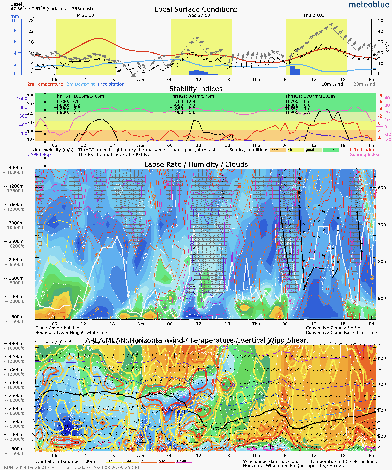
The Meteogram Thermal Forecast contains atmospheric data for forecasting flight conditions for paragliding, soaring and ballooning.
It includes detailed information about surface conditions, stability indices, lapse rate, humidity, clouds and wind. The forecasts are shown for the next 3 days.
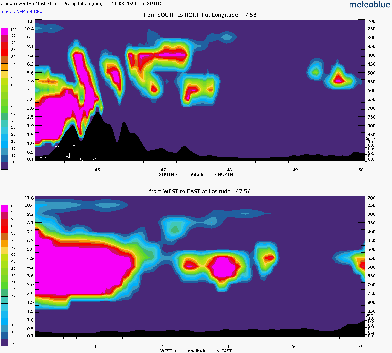
The meteoblue Cross-Sections show a vertical cut through the atmosphere. The standard Cross-Sections have two directions: North-South and West-East.
The selected place is in the centre of the display (black line). The Cross-Sections can be customised setting the distance from the center (in "degree"), together with the time of the forecast.
In addition to the default version, the following Cross-Section variants are available for specific use cases:
The following meteograms display the weather forecasts calculated by different models or ensemble members of the GFS ensemble forecast.
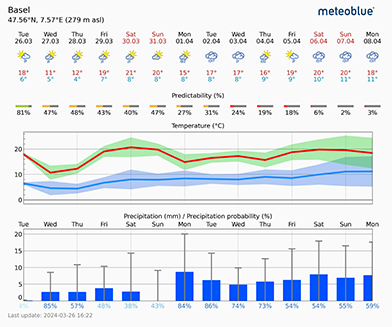
The Meteogram 14-Day shows the weather forecast for the next 14 days, with weather pictograms, a range of maximum, average and minimum temperatures and precipitation amounts, as well as the precipitation probability for each day.
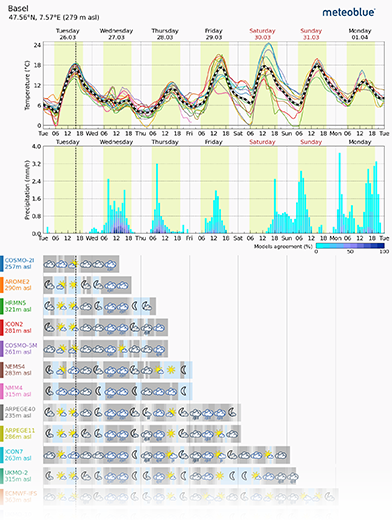
The Meteogram MultiModel shows and compares forecasts of various models from meteoblue as well as third party operators, corresponding to a grid cell of the selected model, without local adaptations to a specific location.
The purpose of the MultiModel is not to make local predictions for the selected place, but to show the possible divergence of the evolutions of the weather, through the presentation of different models.
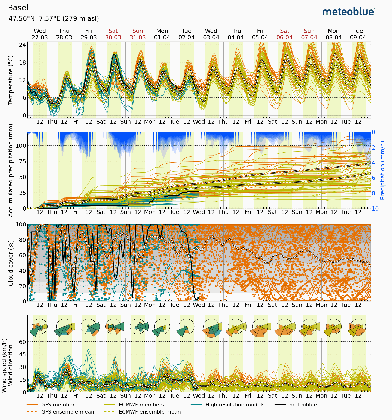
The Meteogram MultiModel Ensemble shows diagrams for temperature, accumulated precipitation, cloud cover and wind speed and direction. The diagrams display different model data individually, as well as an ensemble mean, differentiating the meteoblue models and high resolution models.
The following meteograms display the meteoblue weather forecasts focused on specific variables and purposes.

The meteogram Solar Forecast shows the expected solar power production for the next 6 days. The solar power plant can be specified with setting kWp, slope and orientation.
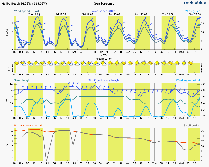
The meteogram Sea shows marine weather forecasts for locations at sea. It shows detailed information about wind speed and direction, precipitation, wave and swell heights and periods.
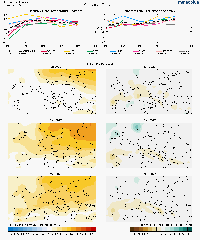
The Seasonal Forecast Diagram contains all relevant information for trend forecasts of seasonal anomalies for the next 6 months. It displays monthly seasonal forecast anomalies from different models as well as a super-ensemble (SA-ENSEMBLE) created by meteoblue, which is a mean based on over 300 individual forecasts from different forecast centers and is more likely to be true than any single model.
The following images display the meteoblue Historical & Climate Images. They include the weather archive, risk assessments and various other historical meteograms. All History & Climate Images are available through the meteoblue Image API.
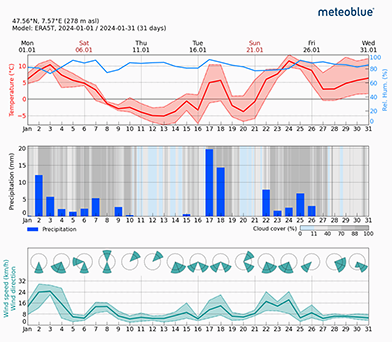
The meteogram Weather Archive shows the historical simulated temperature, relative humidity, precipitation, cloud cover, wind speed and wind direction for any desired period and location.
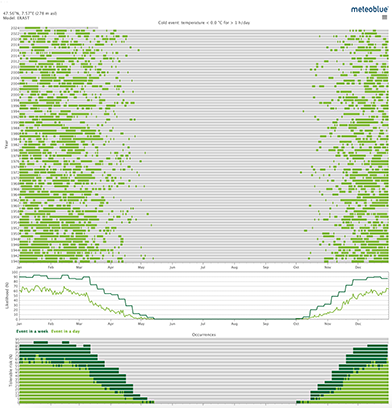
The Risk Assessment diagrams show the probability of a specific, customisable weather event to occur, for any location on earth. The diagrams are available for cold and warm events, precipitation, water capacity, cloud cover, wind speed and wind gust are based on more than 30 years of historical simulation data.
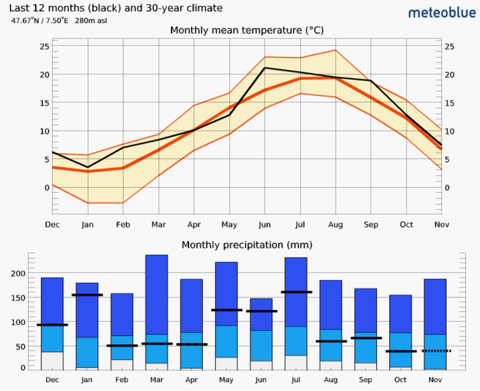
The Climate Comparison Diagram compares weather variables of the current season to the 30 year mean climate, for the variables temperature and precipitation.
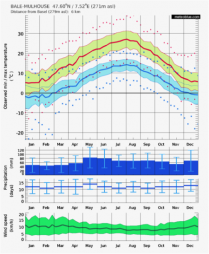
The Climate Observed Diagram shows the annual course of temperature, precipitation amount and days, as well as wind measurements from the closest weather station, aggregated on a weekly or monthly basis.
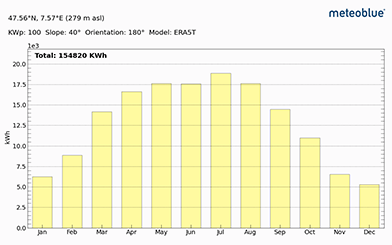
The meteogram Solar Season shows the mean monthly solar power production unit over the last 10 years. The solar power plant can be specified with setting kWp, slope and orientation.
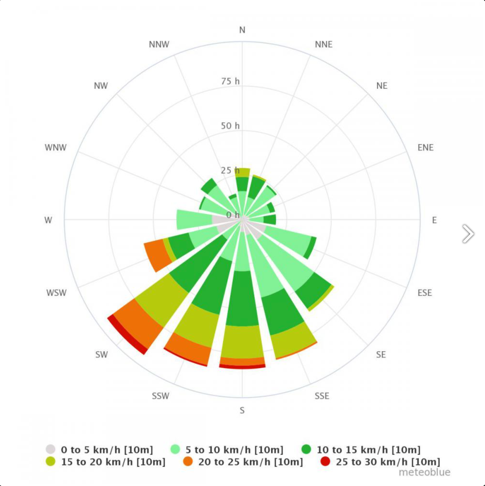
The meteogram Climate Wind Rose shows how many hours per year the wind blows from the indicated direction. The data is accumulated from 30 years of historical weather simulation data from the global meteoblue model NEMSGLOBAL, which has a resolution of 30km.
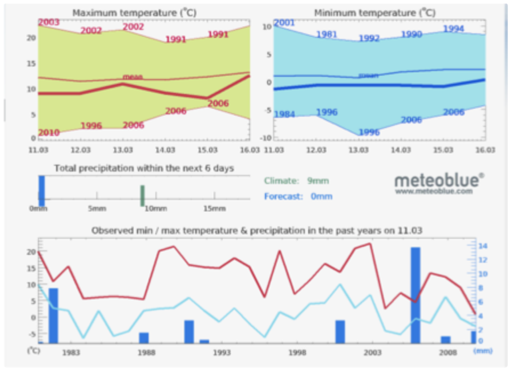
The Climate Comparison Diagram shows the expected weather, compared to the weather of the previous 10 (or more) years. Thereby, you can see how "normal" the current weather is.
Climate Comparison locates the nearest location with a weather station for which a minimum of 10 years of reliable measurements are available. The name of the place where the station is located is indicated in the title, as well as the distance from the selected place.

If you have any questions or need advice, please get in touch. Our expert on the meteoblue Image API will get back to you shortly.
Michaela Schlögl
Head of Sales & Support

